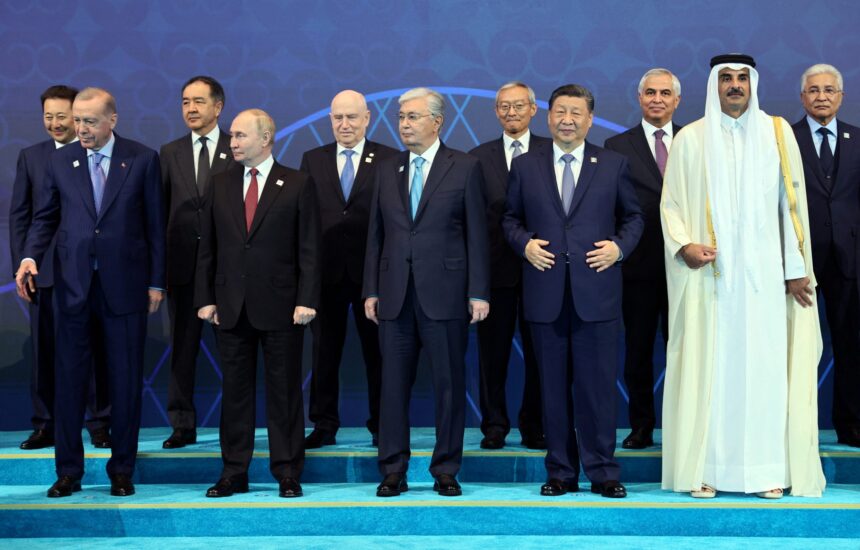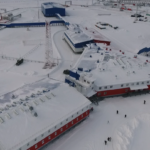Summary by Geopolist | Istanbul Center for Geopolitics
The ISPI article explores the evolving dynamics between China and Russia within the Shanghai Cooperation Organisation (SCO). It discusses how both countries leverage the SCO to enhance their geopolitical influence and counterbalance Western powers. The analysis delves into the strategic interests of each nation, the impact of recent global events, and the potential future trajectory of the SCO amidst shifting international relations.
Read the full article below.
On 3rd and 4th July, the annual Head of State meeting of the Shanghai Cooperation Organisation (SCO) was hosted in Astana as part of the SCO’s Kazakh presidency. Despite its over twenty years of activity, the SCO has seldom attracted Western attention, considered, at best, a “talk shop” like ASEAN, and, at worst, a NATO-competing “puppet organisation” — merely an expression of Russia and China’s interests.
During the last seven years, however, the expansion of the “SCO family” has suggested a change in the original mandate of the Organisation, once primarily focused on ensuring safe and secure borders and promoting military confidence-building mechanisms between Russia, China, and post-Soviet Central Asia. The entry of Pakistan and India as full members in 2017 and Iran and Belarus in 2023 and 2024 at record speed shows that the Organisation is willing to adopt a broader geographical focus, going well beyond post-Soviet Central Asia. Indeed, the reassuring message: “the member states consider Central Asia to be the SCO’s core” (and similar versions) has recently become a staple of the Organisation’s official discourse as an attempt to counterbalance its noticeable West-Asian expansion.
Belarus’ full membership this year opens the doors of Europe to the SCO, with Minsk being the first European country officially to join the Organisation. After the sanctions imposed on Belarus by the European Union in 2022, the SCO also represents the sole non-post-Soviet multilateral framework through which Belarus can aim to shore up its economy and develop new bilateral partnerships. In fact, it was not a surprise that during the 2022 annual Head of State meeting, Lukashenko met with Chinese President/Secretary General Xi Jinping to raise the bilateral ties between the two nations to the highest possible status (a comprehensive strategic partnership).
Moreover, through the SCO’s enlargement, Moscow and, to some extent, Beijing, show the (Western) world that neither of these two powers will ever be truly internationally isolated, despite Western isolation of Russia following its invasion of Ukraine and China’s increasingly tense relationship with Europe and the US. A final aspect generally overlooked by Western observers is how deep-seated China’s interest in the SCO is, which considers the Organisation the first successful attempt to construct a multilateral organisation centred around China and Chinese principles.
The sheer number of Chinese research centres receiving state funds to study the Organisation is a tell-tale sign. Truly, at the very beginning of the SCO, Russia played an immensely important part in ensuring the Organisation’s development, especially in terms of security and military cooperation; however, the Chinese footprint is now stronger than ever, as shown by the depth of the proposals set forth by Moscow and Beijing with China’s becoming more and more ambitious and all-encompassing over the years and Russia’s shrinking to traditional (or safe) areas of multilateral cooperation.
The SCO has proven to be fertile ground for China’s preferred mode of diplomacy – developing bilateral ties – as the numerous agreements and pledges of support to Kazakhstan, in particular, have demonstrated this year. Above all, see the backing of Astana’s bid to enter the BRICS, which aligns with Beijing’s desire to expand the bloc.
In sum, despite recognising the limitations of the SCO as a fully functioning international organisation, this multilateral framework continues to offer a socialising platform to Global South countries outside the constraints of Western-led institutions. As such, the SCO is quickly becoming a platform that sees China occupy an evermore central stage and that is increasingly attractive to countries across the Global South, even beyond Central Asia.
This commentary was originally published by the China-Global South Project on 4th July. The author thanks Lukas Fiala (LSE) for his editorial support.
Source: ISPI







